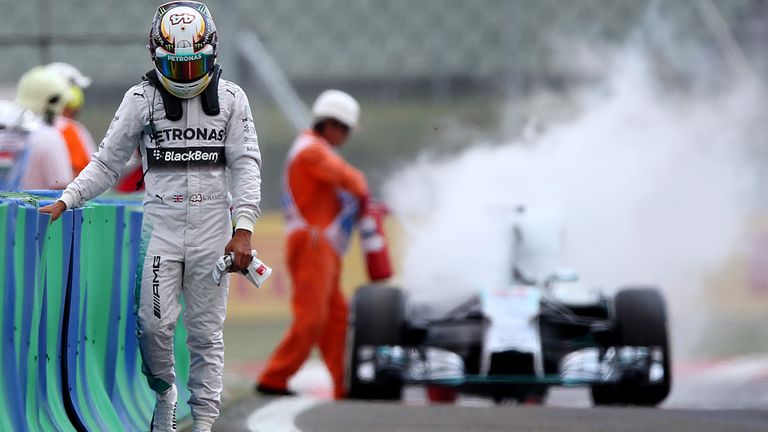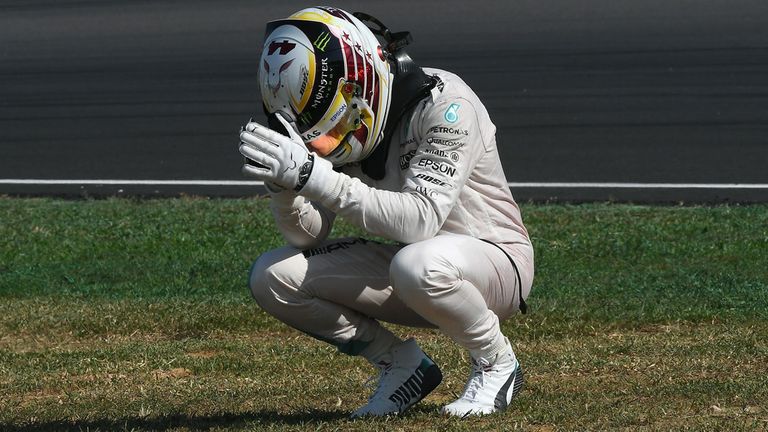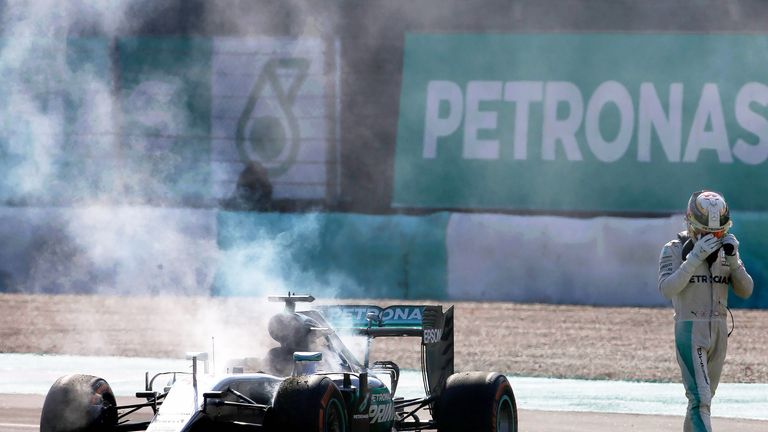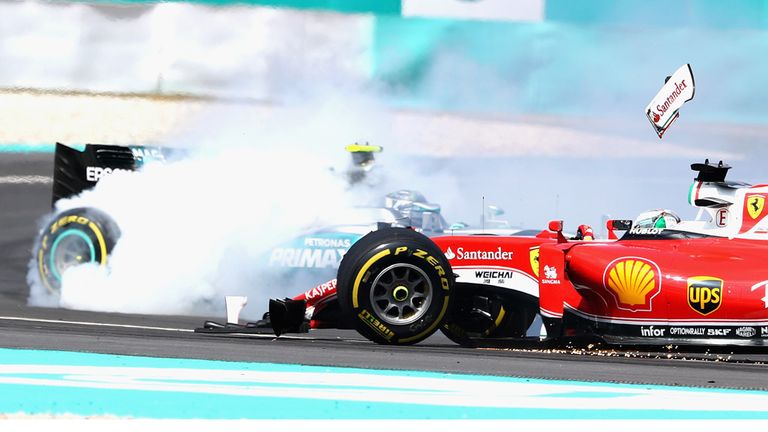F1 2016: Just how unlucky has Lewis Hamilton been this season?
The Mercedes driver has suffered the brunt of the team's unreliability but it could all turn around again...
Monday 10 October 2016 10:52, UK
Lewis Hamilton's latest engine blow-out not only gifted Nico Rosberg a 23-point lead in the title race, but also had the world champion demanding reliability answers from his Mercedes team.
"It is not my lowest point - I have had lower points for sure - but in terms of feeling helpless that is the most helpless I can be at this point," said the three-time world champion.
Mercedes admitted at Sepang they could give "no explanation" to their driver for why he has persistently suffered reliability failures this year and as F1 hurtles towards the final stretch of the 2016 season, there are no guarantees that Hamilton's car won't break down again - and cost him a third successive world title.
How unlucky has Hamilton been?
Hamilton has suffered five specific instances of debilitating unreliability this year. They are:
- An ERS failure at the start of qualifying in China, relegating him to 22nd on the grid. He finished seventh.
- An ERS failure during Q3 in Russia, restricting the Mercedes driver to 10th on the grid. He finished second.
- An engine mode issue during the European GP. He finished fifth having started in 10th following a crash in qualifying.
- A hydraulics fault during Practice Two in Singapore which was cited as a critical factor in his defeat to Rosberg. He finished third.
- An engine blow-out in Malaysia which cost him an almost-certain victory.
There is, of course, no way of determining how many points Hamilton's 'bad luck' has cost. But it could be reasonably argued that it has denied him at least 40 points this year - 12 in China, when Mercedes were a class above the rest, 25 in Sepang, and ten in Belgium when Hamilton was relegated to the back of the grid after Mercedes introduced fresh power units to compensate for his early-season failures.
Hamilton supporters would also argue unreliability accounted for more lost points in Sochi and Singapore, but it's by no means clear the Englishman had a pace advantage over his Mercedes team-mate Rosberg on those weekends.
Does it really only happen to Hamilton?
While the conspiracy theorists inevitably blew a gasket after Hamilton's Sepang blow-out, the notion Hamilton is the victim of deliberate sabotage can be instantly dismissed. Hamilton is the team's most powerful asset, any deliberate sleight of hand would have been uncovered in such a forensically-scrutinised operation, and there are easier and more subtle ways of crippling a car than making its engine go bang with 15 laps of a grand prix to go.
But that doesn't explain why Hamilton has suffered the brunt of Mercedes' unreliability this year.
"I just can't believe that there's eight Mercedes cars and only my engines are the ones that have gone this way," he told Sky F1 in Malaysia. "It was a brand new engine. It's just odd. There's been like 43 engines for Mercedes and only mine have gone."
"What he said was absolutely factual," acknowledged Sky F1 pundit Martin Brundle. "It is difficult to understand."
Even Hamilton's numbers added up: each of the eight cars powered by Mercedes have received the five power units every driver is allowed to use without penalty this season. The remaining three are the trio of fresh units the team brought to Belgium for their lead driver. And one of those has already blown up - with the fear now that the batch introduced at Spa may be plagued by a chronic fault.
In short, Hamilton's Sepang blow-out may yet happen again.
So why always him?
'Could it be installation problems?' mused Brundle in his latest column for Sky Sports. 'It's very unlikely because there have been different failures and given the experience, processes and data this would show up quickly.
'How about driving style? With the latest seamless shift gearboxes it is impossible to miss a gear or over-rev on downshift. If he's bouncing off all the kerbs and putting extra load through the transmission and power plant it would be clear to see in the data.'
Which only leaves bad luck - and Hamilton's suggestion that a "higher power" may be working against him. Given that F1 is important but not that important, it has to be simply a case of bad luck.
Would Rosberg be a lucky champion?
The German has undoubtedly been the chief beneficiary of Hamilton's bad luck this year, but Rosberg himself is no stranger to misfortune after plenty of reliability problems in 2014 and 2015.
"I've been in his position," Rosberg said on Sunday. "I know how terrible it is in that moment."
But measuring bad luck is a complex business. For instance, the above table doesn't take into account the qualifying breakdowns Hamilton suffered midway through the 2014 season when his brakes failed in Germany and his car caught fire in Hungary.
And detailing a mechanical glitch can be a multi-layered arrangement. Take Rosberg's grid penalty in Austria, for example, when the German driver was demoted five places after a gearbox change. Mechanical failure? Yes and no. The unit was broken, but only after Rosberg crashed in practice, an accident which in turn was attributed to a suspension failure that may or may not have been caused by Rosberg riding too far over the circuit's notorious sausage kerbs.
Nevertheless, it can be stated as fact that Rosberg's car hasn't been completely bullet-proof this year. His W07 suffered a gearbox glitch late in the British GP, a malfunction which ultimately demoted him from second to third and enabled Hamilton to take the lead of the title race.
But while Rosberg hasn't been entirely immune from misfortune this year, there have been none of the clear-cut, high-profile, high-impact bad breaks which have repeatedly beset his team-mate.
How fortunate was Rosberg in Malaysia?
The world championship leader certainly rode his luck on Sunday. He could have been wiped out of the race at the first turn when his Mercedes collided with Sebastian Vettel. His W07 could have then suffered terminal damage when the rest of the field hurtled into Turn One but somehow avoided hitting the spinning Mercedes. He could have suffered self-inflicted race-ending damage when he barged into the side of Kimi Raikkonen's Ferrari. And although he was then punished by the steward for causing the collision, the punishment - ten seconds of track time - was less than the amount of time Raikkonen, who finished directly behind Rosberg in fourth, lost due to the damage done to the floor of his car.
Most saliently of all, Rosberg lucked into a 28-point swing when Hamilton retired from the lead. But for the failure on the other W07, Rosberg would have been second in the standings heading to Japan. Instead he leads by 23 with just five races to go.
But bad luck tends to be a fickle interloper. Hamilton has been persistently unfortunate throughout 2016 but there are still 20 other drivers in the field envious of his good fortune to be in the title race. And all it would take for him to regain the lead of the World Championship this weekend in Japan is victory and one piece of very bad luck for Rosberg.






